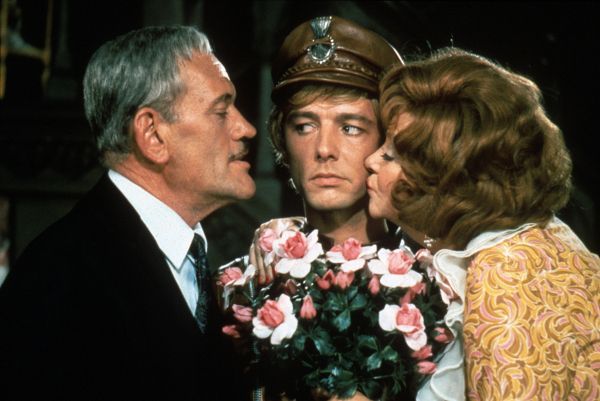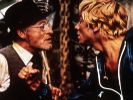Eye For Film >> Movies >> Entertaining Mr Sloane (1970) Film Review

Between the first showing of Joe Orton's seminal play and the release of Douglas Hickox's film in 1970, the world changed dramatically - and not just in theatre. Sex between men over 21 was legalised in England and Wales (it would take another 13 years for Scotland to catch up) and the country had begun to talk about homosexuality and countenance it as part of life - it was still widely disdained but the old conspiracy of silence was broken. The fear which had controlled many LGBT people's lives was beginning to break down.
In this different environment, Sloane still shocked, but for slightly different reasons. Most of those going to see it were already familiar with the rough outline of the play. Perhaps in the interests of preserving the original impact, Hickox upped the ante with suggestive camerawork and props. The see-through dress which Beryl Reed wears in the opening scenes sets the tone for a banquet of sleaze that expands upon the play with playful reference to the pop culture and cinema of the era.

At its heart, the tale is a simple one and quite traditional in its mores: a young man does a bad thing and gets his comeuppance. That young man is the titular Mr Sloane (Peter McEnery), though we never know all the details of what he's done or, indeed, anything about his past before that. Stumbles upon in a graveyard by the primly lascivious Kath (Reid), he takes up residence as her lodger, only to discover that her shortsighted father (Alan Webb) may have witnessed him committing his crime. To complicate things further, he catches the eye of her brother Ed (Harry Andrews), who soon finds himself on a position to blackmail him. The balance of power shifts around between the three as the farce develops. One of Orton's more unusual talents was the ability to sustain such plots all the way to a tight conclusion, and Entertaining Mr Sloane is a splendid example of that.
Fresh from similarly scandalous adaptation The Killing Of Sister George, Reid brings something to the film that is all her own. She is perhaps not as sensuous as the character of Kath was originally intended to be, but she captures the frustrations of the aspiring classes perfectly, and delivers her cruelest lines with an underlying pathos that adds weight to the playful script. McEnery, meanwhile, gives us a character who is revolutionary in his ordinariness - not in the least what audiences expected of a bisexual man (to the extent that bisexuality was acknowledged as a concept at all). He looks like a hero plucked for any one of a dozen cop shows popular at the time.
The utter absence of real moral concern in any of the characters has become more visible as its sexual themes have faded in significance. Despite the cheerful crudity of much of its humour, its jabs at middle class hypocrisy are often as subtle as they are pointed; there is much in this that was personal to Orton and it was his strongest suit as a writer. Most of the sharp dialogue of the play survived the transition to the screen, yet it's fairly successful in avoiding staginess. Though the inexperience of both Orton and Hickox is clear, there's a lot of enjoy here; despite it intellectual and sometimes sinister undertones, it is dangerously close to being what the tabloids refer to as a romp.
Reviewed on: 12 Sep 2017

















